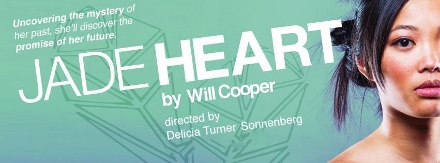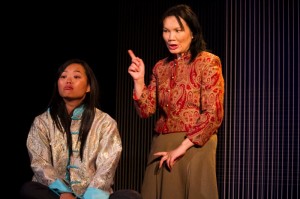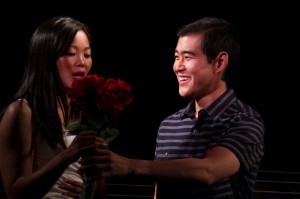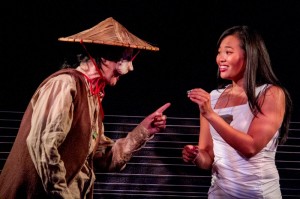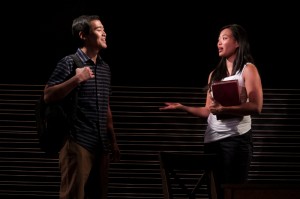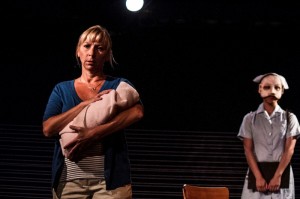THE GREAT CALL OF CHINA
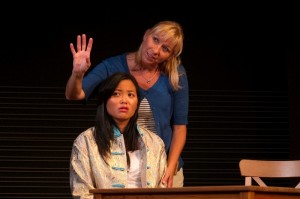 The very nature of adoption can leave a child’”and the adult he or she becomes’”filled with questions: Who were you, Mother? Why did you make this choice? Do you regret it? And perhaps most painful to ponder: Would you be glad to meet me, if you could? For Jade McCullough (Dana Lau), these normal questions are compounded by her birth country; she wrestles with whether she considers herself Chinese (being born there) or American (because she has no memories of anyplace else), especially as others confront the same question as it applies to her clearly Asian features. Within this internal and external struggle, Jade hasn’t fully connected to either culture, and is left to grapple with conflicted feelings that cannot be resolved because of unanswerable questions.
The very nature of adoption can leave a child’”and the adult he or she becomes’”filled with questions: Who were you, Mother? Why did you make this choice? Do you regret it? And perhaps most painful to ponder: Would you be glad to meet me, if you could? For Jade McCullough (Dana Lau), these normal questions are compounded by her birth country; she wrestles with whether she considers herself Chinese (being born there) or American (because she has no memories of anyplace else), especially as others confront the same question as it applies to her clearly Asian features. Within this internal and external struggle, Jade hasn’t fully connected to either culture, and is left to grapple with conflicted feelings that cannot be resolved because of unanswerable questions.
Adding to her confusion in Will Cooper’s Jade Heart is that her Caucasian adoptive mother, Brenda (Julie Sachs), has allowed Jade to keep the only remnant of her birth mother: Half of a jade heart on a necklace. Chinese tradition, recognizing that two long-time separated people may not recognize each other upon meeting again, says that the exact fit of the two heart halves will prove the connection. In cherishing the only gift her birth mother bestowed upon her, it torments Jade that, surely, the woman must have cared at least somewhat.
The plot points above are all made clear in the first few minutes. The first act constantly time-jumps; minor costume and voice changes make it easy to tell if Jade is a curious little girl, an angsty teen, or an infant in China. But the emotional connection to the main characters was unfortunately low. Seemingly trying to maintain clarity, director Delicia Turner Sonnenberg had many lines stated more than experienced. One exception occurred when Dana Byrne gave a lovely, subtle showing as young Jade’s Chinese babysitter who tries to expose her to the culture she missed out on.
Act II was notably better when time moves to another age and we see who the young woman Jade becomes during and after college. In Jade’s more mature assessment of her turmoil, Lau’s performance becomes more open, moving, and heartfelt, yielding a three-dimensional character. Likewise, plot development allows Sachs to show more dimensions of Julie’s motivations, pulling us further in. The adoption theme of “abandonment” takes shape in more ways than the obvious one.
Mask work by minor characters (played by Byrne, Albert Park, and Joyce Lai) not only allows non-Asians to seamlessly play Asian roles but also adds to the other-worldly feeling of Chinese culture, as it both intrigues and alienates Jade. Natalie Khuen’s set design is tastefully simple and effective for the transitions.
The timeless theme of abandonment may touch various audience members differently based on their own life experiences. Likewise, those who have lived through cross-cultural adaptations, as with Jade’s boyfriend who was raised in China, might have a stronger connection to this tale. Still, the uneven direction and script alternated in tone too frequently, defusing the power of a moving story. MOXIE’s Jade Heart ends up more pleasant storytelling than must-see production.
photos by Daren Scott
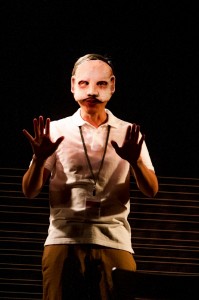 Jade Heart
Jade Heart
MOXIE Theatre
6663 El Cajon Blvd, Suite N
Thurs-Sun at 8:00, Sun at 2:00
scheduled to end on August 10, 2014
for tickets, call 858-598-7620
or visit www.moxietheatre.com
